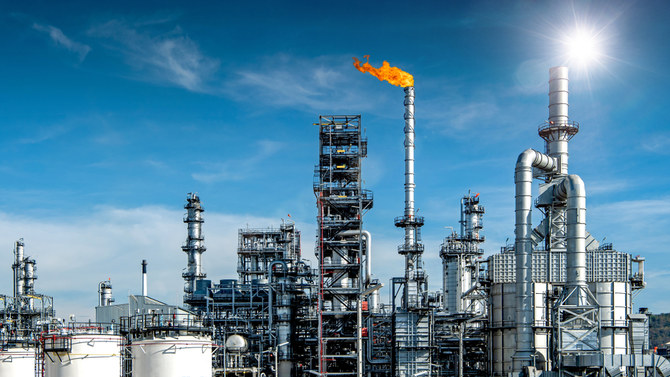RIYADH: Oil prices firmed on Thursday, erasing earlier losses, on indications that the Organization of the Petroleum Exporting Countries and its allies, known as OPEC+, might cut output, though a stronger dollar and weak economic outlook kept a lid on gains.
Brent crude futures rose 38 cents, or 0.43 percent, to $89.70 a barrel by 02.40 p.m Saudi time and West Texas Intermediate crude futures rose by 19 cents, or 0.23 percent, to $82.34.
Crude falls amid OPEC+ output cut rumours
Oil prices fell on Thursday, with a stronger dollar paring the previous day’s more than $3 gain, though losses were capped by indications that the Organization of the Petroleum Exporting Countries and its allies, known as OPEC+, might cut output.
Brent crude futures fell $1.55, or 1.74 percent, to $87.77 a barrel by 11.50 a.m Saudi time and US West Texas Intermediate crude futures dropped by $1.30, or 1.58 percent, to $80.85.
Indian refiners pay dollars for Russian oil after dirham attempts fail
Indian companies are still buying Russian oil using dollars after Dubai’s Mashreq Bank declined to handle payments from at least two refiners in Emirati dirhams as requested by the supplier, according to three sources familiar with the matter.
Russia has been hit by sanctions from the US and allies following its invasion of Ukraine, and Moscow has requested some buyers of its commodities pay using roubles or other currencies than the dollar and euro which its contracts are typically priced in.
Traders supplying Russian oil in July had asked at least two Indian companies to settle in dirham. An invoice from one of the refiners seen by Reuters showed oil payments were calculated in dollars while the payment was requested in dirhams.
The invoice showed payments to be made to Gazprombank via Mashreq Bank, its correspondent bank in Dubai. Mashreq has a branch in New York, according to its website.
The three sources said the dirham payments did not go through because Mashreq declined to facilitate the trade.
Afghan Taliban sign deal for Russian oil products
The Taliban have signed a provisional deal with Russia to supply gasoline, diesel, gas and wheat to Afghanistan, Acting Afghan Commerce and Industry Minister Hajji Nooruddin Azizi told Reuters.
Azizi said his ministry was working to diversify its trading partners and that Russia had offered the Taliban administration a discount on average global commodity prices.
The move, the first known major international economic deal struck by the Taliban since they returned to power more than a year ago, could help to ease the Islamist movement’s isolation that has effectively cut it off from the global banking system.
Azizi said the deal would involve Russia supplying around one million tons of gasoline, one million tons of diesel, 500,000 tons of liquefied petroleum gas, and two million tons of wheat annually.
On Wednesday, Russia’s state-owned TASS news agency quoted Moscow’s special representative for Afghanistan, Zamir Kabulov, as confirming that “preliminary agreements” had been reached on fuel and food supplies to Kabul.
Russian oil and gas sector braces for tax hikes of over $60 billion
The Russian government has proposed more than $60 billion in tax increases for the oil and gas industry in 2023-2025, the biggest such rises in the country’s history, as it seeks to plug its budget gap, according to a document published on Wednesday.
One of the heftiest burdens was slapped on Kremlin-controlled gas giant Gazprom, which is set to pay an extra 50 billion roubles ($855 million) in mineral extraction tax each month over the three-year period, according to the proposed tax code changes.
The budget is seen gaining an extra 628 billion roubles in 2023, almost 700 billion roubles in 2024, and 750 billion roubles in 2025 just by increasing MET on natural gas production.
Total additional oil and gas tax revenues are seen at 1.28 trillion roubles next year, 1.13 trillion roubles in 2024, and 1.19 trillion roubles in 2025. Prime Minister Mikhail Mishustin said last week Russia’s budget deficit would come in at 2 percent of the gross domestic product in 2023 before narrowing to 0.7 percent in 2025.
The tax change bill will go to parliament for debate and then needs to be signed off by President Vladimir Putin.
TotalEnergies plans to spin off Canadian oil sands assets
TotalEnergies said on Wednesday it is looking to spin off its Canadian oil sands operations and list the new company on the Toronto Stock Exchange, as the assets do not fit with the French oil major’s low-emissions strategy.
At an investor presentation in New York, TotalEnergies said the proposal would be subject to a shareholder vote at its next annual general meeting in May 2023.
The spin-off would include TotalEnergies’ 24.58 percent stake in Suncor Energy’s Fort Hills oil sands mining project in northern Alberta and its 50 percent stake in the ConocoPhillips-operated Surmont thermal project, as well as midstream and trading-related activities.
Canada’s oil sands hold some of the world’s largest crude reserves but are more carbon-intensive and costly to produce than many conventional oil projects worldwide.
“We are not the best shareholder of these assets because as we have a climate strategy, we don’t want to invest in these assets,” TotalEnergies CEO Patrick Pouyanne said.
The French major’s oil sands assets will generate $1.5 billion of cash flow in 2022, he added.
(With input from Reuters)
















